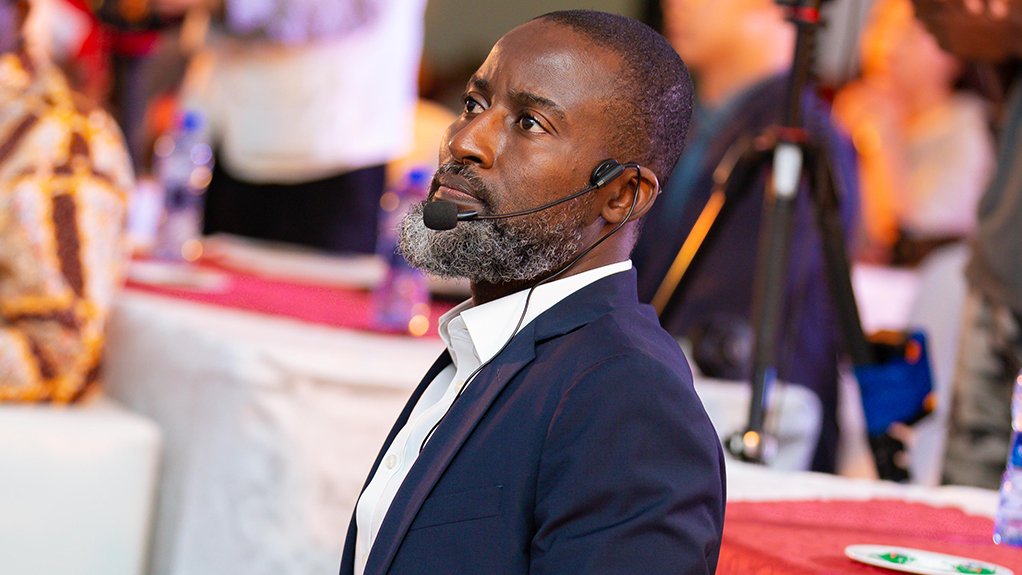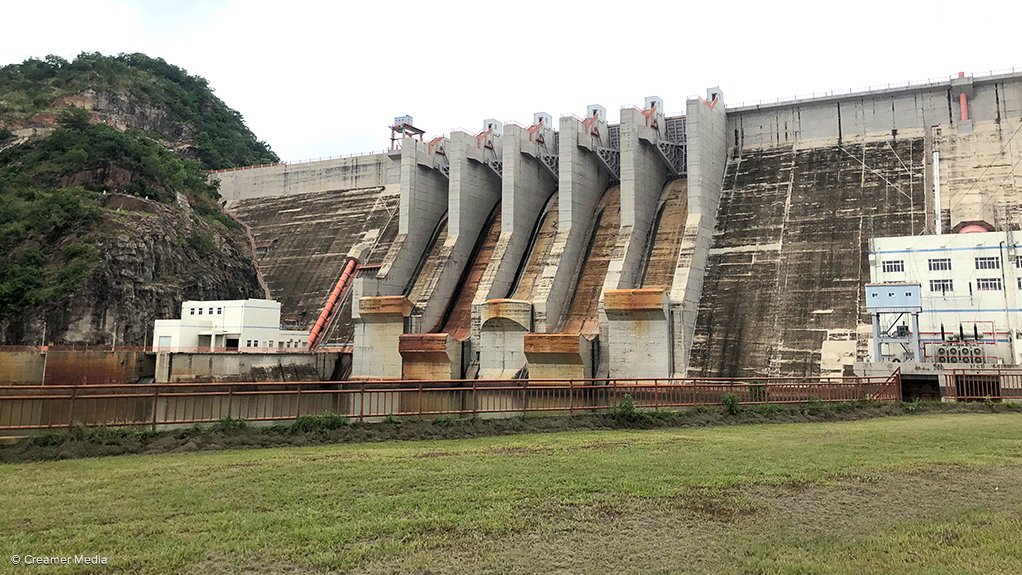Ghana aims for 30% nuclear, 20% renewables in energy mix by 2070



Energy Ministry power directorate deputy director Seth Mahu
Bui hydro power dam in Ghana
Photo by Creamer Media's Darren Parker
Ghana is gunning for nuclear energy to account for 30% of its energy mix by 2070, with renewable energy set to account for about 20%.
“We see three key energy sources play a leading role in the supply of energy for the people of this country. First, we want to expand renewable energy to about 20 000 MW by 2070. That will mean that renewable energy will account for 20% of the country’s energy mix,” Energy Ministry power directorate deputy director Seth Mahu told journalists in Accra last week.
He added that Ghana was also “aggressively” pursuing nuclear energy.
“We have established the necessary arrangements to ensure we are able to bring on board nuclear energy to complement renewable energy to meet our generation demands going into the future,” he said.
Ghana’s energy mix has historically largely been dominated by liquefied natural gas- (LNG-) based thermal energy generation, representing nearly 69% of the country’s energy supply. Hydropower generation accounts for about 30%.
Energy security concerns, however, arise when there are droughts, which impact on hydropower generation. Ghana is also seeking to limit its reliance on LNG as it works to lower the carbon footprint of its energy sector.
Mahu said the diversification of the country’s energy base was, therefore, critical to ensure stability and security of supply.
He added that the Energy Ministry had embarked on a renewable energy promotion scheme, whereby a set of policy frameworks had been put in place to create an enabling environment for renewable energy investors, particularly private sector investors.
“We also put together the Renewable Energy Master Plan that provides the blueprint, or the roadmap, for renewable energy development in the country. In terms of policy, we intend to achieve 10% renewable energy installed capacity by 2030,” he said.
This means that about 1 350 MW of installed renewable energy generation capacity will be added to the national grid by 2030.
Just prior to the Covid-19 pandemic, Ghana’s renewable energy capacity accounted for less than 1% of the country’s energy supply. This has since increased to about 7%.
Ghana has recently added additional solar power generation capacity at its Bui hydropower plant. The new 50 MW ground-based solar photovoltaic (PV) component, which included a new 5 MW floating solar PV power plant, created Ghana’s first hydro-solar hybrid system.
The installation of multiple 10 MW battery energy storage solution systems, which included high-capacity inverters, supplied by Chinese information and communication technology company Huawei, allows for the smooth transition and mix of hydro-solar hybridisation.
A Huawei smart grid evolved long-term evolution (eLTE) private network solution was also supplied. This broadband LTE solution is based on the 1.8 GHz licensed spectrum and provides industrial customers with a comprehensive network that integrates wireless broadband access, trunking service, data transmission and video viewing functions.
“We believe the private sector, partnering with the public sector, will be able to deliver this solution. Going forward, we need to ensure we are able to sustain and expand the economy beyond these targets, and also remain mindful of the challenges that climate change presents to us globally,” Mahu said.
He noted that LNG would continue to play a critical role in the country’s energy mix, although the country’s dependence on it as an energy source would be reduced by about half.
“We believe strongly that natural gas will contribute about 34% to the generation base by 2070.
“The current energy mix is made up of thermal, hydro and renewable such as solar. However going into the future, we see an energy mix that will be tilting towards renewables, nuclear energy, and natural gas. We believe strongly that, at that point, Ghana's economy will be largely driven or supported by the electricity sector,” he said.
* Darren Parker was a guest of Huawei on a site visit to the Bui Power Authority’s renewables plants in Ghana from June 14 to 18.
Article Enquiry
Email Article
Save Article
Feedback
To advertise email advertising@creamermedia.co.za or click here
Press Office
Announcements
What's On
Subscribe to improve your user experience...
Option 1 (equivalent of R125 a month):
Receive a weekly copy of Creamer Media's Engineering News & Mining Weekly magazine
(print copy for those in South Africa and e-magazine for those outside of South Africa)
Receive daily email newsletters
Access to full search results
Access archive of magazine back copies
Access to Projects in Progress
Access to ONE Research Report of your choice in PDF format
Option 2 (equivalent of R375 a month):
All benefits from Option 1
PLUS
Access to Creamer Media's Research Channel Africa for ALL Research Reports, in PDF format, on various industrial and mining sectors
including Electricity; Water; Energy Transition; Hydrogen; Roads, Rail and Ports; Coal; Gold; Platinum; Battery Metals; etc.
Already a subscriber?
Forgotten your password?
Receive weekly copy of Creamer Media's Engineering News & Mining Weekly magazine (print copy for those in South Africa and e-magazine for those outside of South Africa)
➕
Recieve daily email newsletters
➕
Access to full search results
➕
Access archive of magazine back copies
➕
Access to Projects in Progress
➕
Access to ONE Research Report of your choice in PDF format
RESEARCH CHANNEL AFRICA
R4500 (equivalent of R375 a month)
SUBSCRIBEAll benefits from Option 1
➕
Access to Creamer Media's Research Channel Africa for ALL Research Reports on various industrial and mining sectors, in PDF format, including on:
Electricity
➕
Water
➕
Energy Transition
➕
Hydrogen
➕
Roads, Rail and Ports
➕
Coal
➕
Gold
➕
Platinum
➕
Battery Metals
➕
etc.
Receive all benefits from Option 1 or Option 2 delivered to numerous people at your company
➕
Multiple User names and Passwords for simultaneous log-ins
➕
Intranet integration access to all in your organisation


















